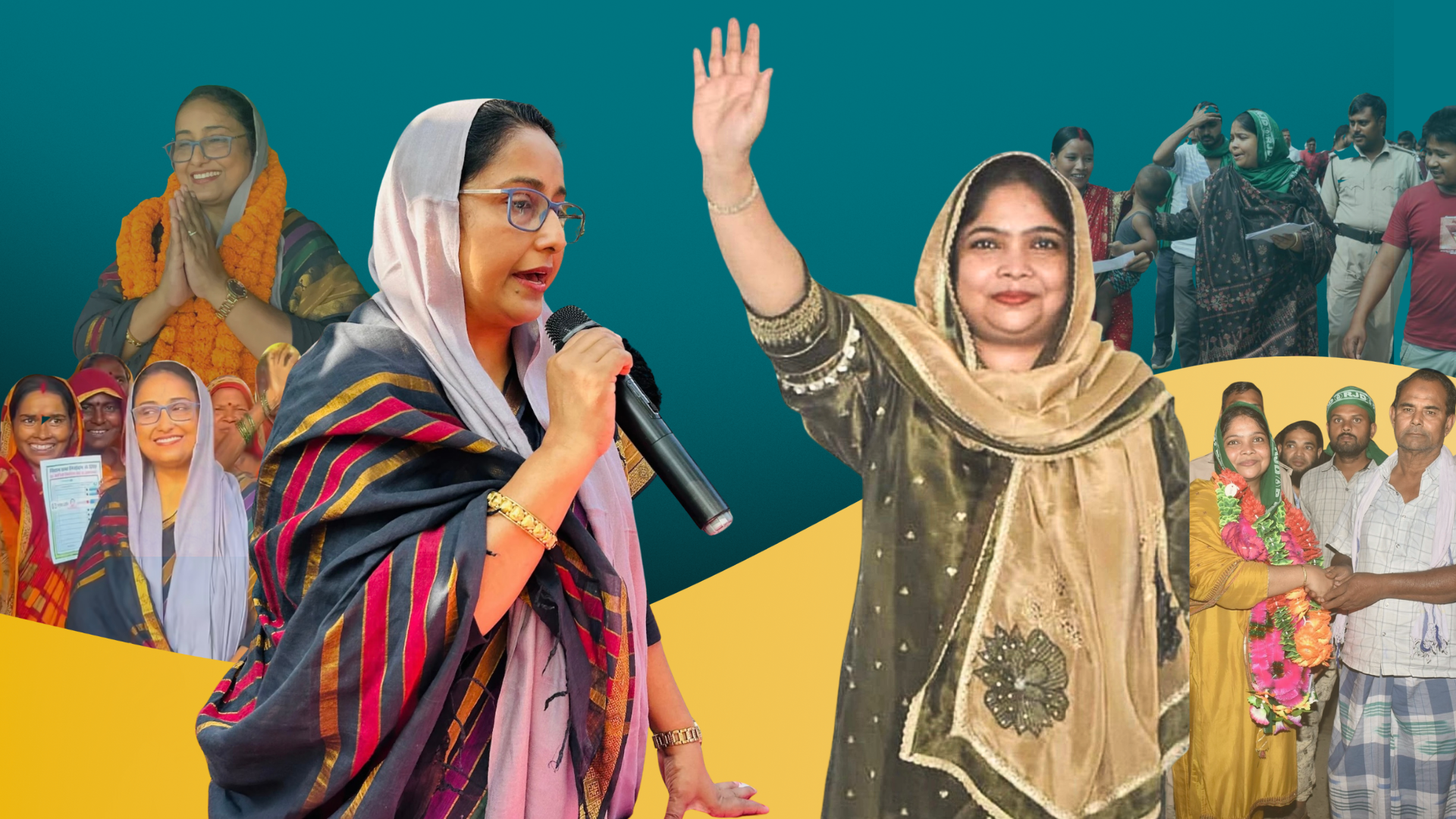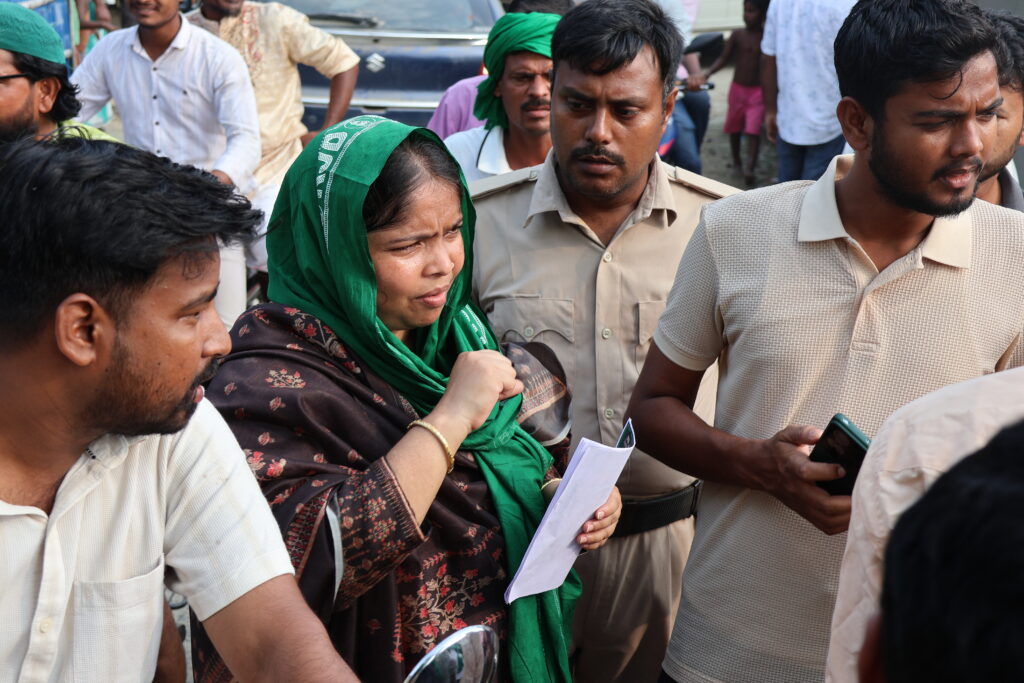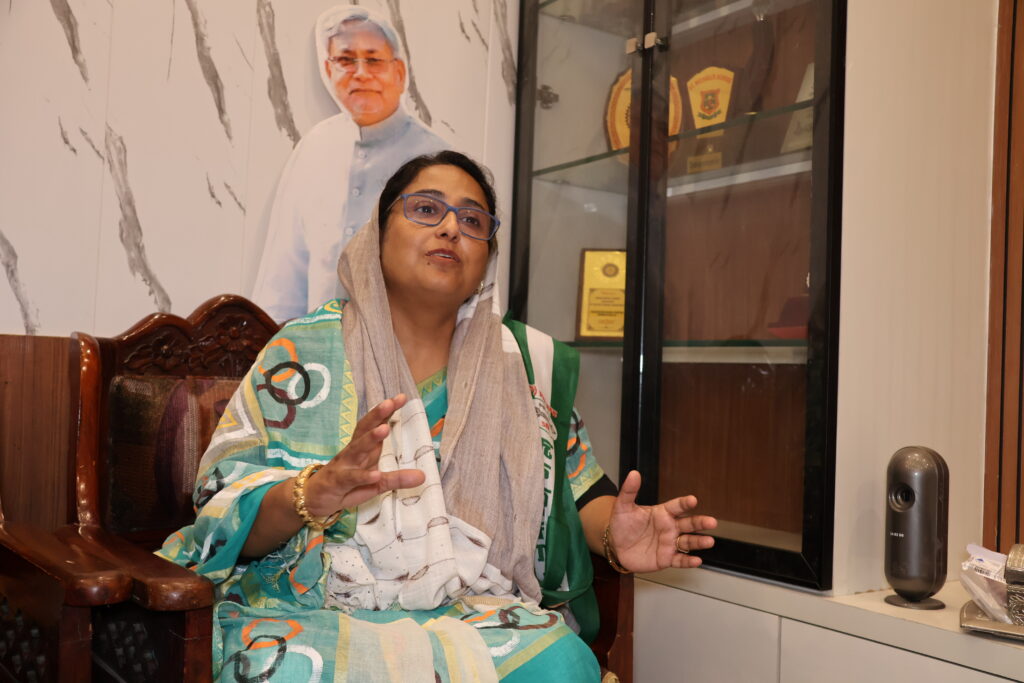Few Muslim Women Candidates In Bihar Where Women Are A Strong Electoral Force
Parties in Bihar have been frugal in giving tickets to Muslim women. Is it the pressure of coalition politics, they ask
- Tanzil Asif

With a green gamchha bearing the lantern symbol of the Rashtriya Janata Dal draped over her head like a dupatta, Ishrat Parween rides pillion on a Royal Enfield through the villages of Pranpur assembly constituency in Bihar’s Katihar district. It’s the last leg of her campaign, and she is determined to make every visit count. Starting early from her home in Malikpur Nimoul, she spends the day meeting voters across a dozen villages, listening, talking, and asking for their support. By evening, the heat and exhaustion catch up with her, but she refuses to slow down with the election just days away.
A hundred kilometers away, Shagufta Azim of the Janata Dal (United) crisscrosses the last remaining villages in Araria constituency.
Shagufta and Ishrat are the only two Muslim women candidates fielded by the two main alliances — the ruling National Democratic Alliance (NDA) and the opposition Mahagathbandhan (grand alliance) in the ongoing Bihar Assembly elections. The former is led by the Bharatiya Janata Party (BJP) and Chief Minister Nitish Kumar’s JD(U) and the latter by opposition leader Rahul Gandhi’s Indian National Congress and Tejashwi Yadav’s RJD. Araria and Katihar go to polls in the second phase of the two phase election being held between November 6 and November 11 for the 243 seats in the state.
Muslims make up 17.7% Bihar’s population, yet political parties have rarely offered proportional representation to Muslims. In these elections, 12.7% of Mahagathbandhan’s and 2% of NDA’s candidates are Muslims. New entrant Prashant Kishor’s Jan Suraaj Party (JSP), which promised proportional representation, gave 12% of tickets (30 candidates) to Muslims.
Muslim women candidates are even fewer. The JSP and even Asaduddin Owaisi’s All India Majlis-e-Ittehadul Muslimeen (AIMIM) have fielded a lone Muslim candidate each. JSP’s Farhat Ara Begum is contesting against Shagufta Azim in Araria, while AIMIM’s Nasima is a candidate from Nawada, far from the party’s traditional strongholds in the Seemanchal region, comprising Kishanganj, Katihar, Araria and Purnia, where 28.3% of Muslim population of Bihar lives.
From Grassroot to State Politics
Ishrat and Shagufta come from very different worlds and this is reflected in their campaign styles. Ishrat is deeply rooted in her rural community, while Shagufta’s outlook is shaped by her urban upbringing and education. Yet, their political journeys share a common arc– they rose from grassroots panchayat politics in the Seemanchal region to the high-stakes arena of state politics.
“My own political career started in 2006, when I was elected a member of Katihar zila parishad and then became its chairman,” Ishrat told Behanbox, as she stopped over for a late lunch at her supporter’s house.

Ishrat did contest the state assembly elections three times before in 2010 on an Nationalist Congress Party (NCP) ticket, which she lost by 716 votes, in 2015 and in 2020 as an independent. This is the first time a major alliance has given her a ticket.
For Shagufta Azim, the debut happened after she married into a family steeped in politics. Her father-in-law Md Azimuddin was a two-time MLA from Sikti and her husband Aftab Azim contested twice.
“I saw my father-in-law’s bond with people from all backgrounds. When local bodies were reserved for women after 2005, my husband’s seat was declared reserved and I contested. That was my beginning,” she told Behanbox, as she took a break from her hectic campaign schedule.
Shagufta went on to contest state assembly elections twice from Sikti – in 2010 on a Congress ticket, and in 2020 from Araria on JD(U) ticket– both times unsuccessfully. She and her husband have alternated as Araria zila parishad chairpersons for nearly two decades.
Muslim Women in Politics
The last time Muslim women entered the Bihar Assembly was in 2010. Parveen Amanullah from Sahebpur Kamal in Begusarai and Razia Khatoon from Kalyanpur in East Champaran were elected from JD(U). A third Muslim woman, Yasmin Sabir Ali of the Lok Janshakti Party (LJP) — then allied with RJD — contested and lost in Narkatia, East Champaran. Parveen also served as a cabinet minister in Nitish Kumar’s government before resigning from JD(U) in 2014 to join Arvind Kejriwal’s Aam Aadmi Party.
Parties have been frugal in giving tickets to Muslim women. In 2015, only two Muslim women from major alliances contested- Razia Khatoon (JD(U)) and Bibi Zeba Khatun, fielded by Hindustani Awam Morcha (Secular), an ally of the BJP. In 2020, JD(U) fielded three Muslim women — Shagufta Azim from Araria, Ashma Parveen from Mahua, and Anjum Ara from Dumrao. The Mahagathbandhan, consisting of RJD, Congress and three Left parties fielded no Muslim women at all.
Compare this to the rise of the women electorate in Bihar– from 54.9% in 2010 to 59.6% in 2020. They have outnumbered male voters in Bihar. In 2010, the gap was 3 percentage points, while it widened to 6 percentage points.
“This points to a disturbing pattern of male migration for livelihood in Bihar. Women vote more because they understand their responsibility in the absence of men,” said Ishrat Parween.
The percentage of women contestants has also seen a rise from 6% in 2005 to 10% in 2025. As has the number of women elected as MLAs–from 17 (8%) in 2005 to 26 (11%), with the highest ever elected in 2010 (32).
In these years, only two Muslim women were elected to the legislature.
Shagufta attributes Nitish Kumar’s decision to give fewer tickets to Muslim women to the pressures of coalition politics. “But it will be my focus to increase the representation of women and especially Muslim women. We will win and raise this issue in the cabinet. Inshallah,” she said.
Bihar introduced 50% reservation for women in local bodies in 2006 under Nitish Kumar — the first state in India to do so. This has seen more women in general, and Muslim women in particular, in local bodies but this shift has been less visible in state and national politics.
“When women in general get fewer tickets, women from deprived communities get even fewer,” said Meena Tiwari, general secretary of the All India Progressive Women’s Association (AIPWA). She emphasised the need for a swift implementation of the Women’s Reservation Bill, now law as the Nari Shakti Vandan Adhiniyam, reserves 33% of seats for women in Parliament and state assemblies. The home minister stated it is likely to come into force after the next census and delimitation exercise.
“Until women’s reservation is implemented, political parties will not feel pressure. Only when more women are nominated will women from all classes get their share,” said Meena.
Ishrat and Shagufta stress that the reform must come structurally, from within the political parties and more women need to be given organisational posts such as district presidents. Ishrat pointed out that three of the 38 district presidents in RJD are women. “Women’s cell in political parties should be decentralised district wise and subdivision wise,” said Shagufta.

Shagufta believes that more Muslim women will enter politics when they see women like her getting elected: “When I campaign, women who come to meet me see me as their own and it inspires them. This is a silent revolution.” Political parties, she said, will see women as winnable and offer more tickets. But Meena contended that the lens of winnability is an inadequate metric. “If we only look through the lens of winnability, women will never appear winnable. Most are nominated only when the male family member cannot contest,” she argued.
“Bohot zaroori hai mahilayein siyasi maidan mein aayen (it is important for women to enter the political fray),” said Shagufta. It is time that women’s aspirations and vision for Bihar is heard and also, she added, women have a cleaner image. “They’re not corrupt or bahubalis (strongmen). They are maa, behan, bahu, beti and will govern as them,” she said.
Political Vision
Ishrat and Shagufta’s political and development priorities intersect in many ways. Both speak of the need to reform the primary public health care in their constituencies which serve the most marginalised. “The ‘referal system’ to higher and distant hospitals must end. For that we need to strengthen primary healthcare with good doctors and infrastructure,” said Shagufta, who has a Masters degree in arts from Patna University.
The state of higher education facilities is of immediate concern for both the candidates. “There is no degree college in the Pranpur area. This is especially important for our girls to fulfil their aspirations. Who will speak about this?” asked Ishrat Parween. Shagufta stressed the need to rein in and cap the fees in private colleges offering B.Ed courses, a popular career choice for women in the state.
“Have you seen the state of the roads and bridges in Pranpur? There is an embankment here but no proper road on it. Residents of five villages have to take a circular route to reach the district headquarters. A road is the lifeline for this region and I want to fulfill that vision,” said Ishrat. For Shagufta, a proper disaster management plan to prevent floods in Kosi river is a priority.
Ishrat has another big priority – to ease the process of getting caste certificates for the Muslim backward castes in the region. Seemanchal’s Muslims belong to four castes — Surjapuri which is classified as a Backward caste and Shershahbadi, Kulhaiya, and Sekhra, which are classified as Extremely Backward Castes. However, many old land deeds of Muslim families record their caste as Sheikh, considered a general (upper) caste in Bihar. This often creates problems when obtaining caste certificates to claim reservation benefits.
“Our kids find it hard to get a Surjapuri certificate. They are asked to get land records of our ancestors. I will fight for our children’s rights,” she asserted. “Ishrat Parveen agar vidhayak banti hai toh yeh baat pathar ki lakeer hai (this is Ishrat Parween’s promise if she becomes an MLA).”
We believe everyone deserves equal access to accurate news. Support from our readers enables us to keep our journalism open and free for everyone, all over the world.

